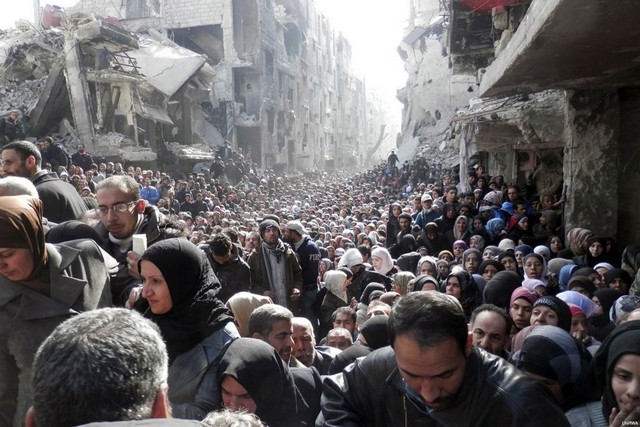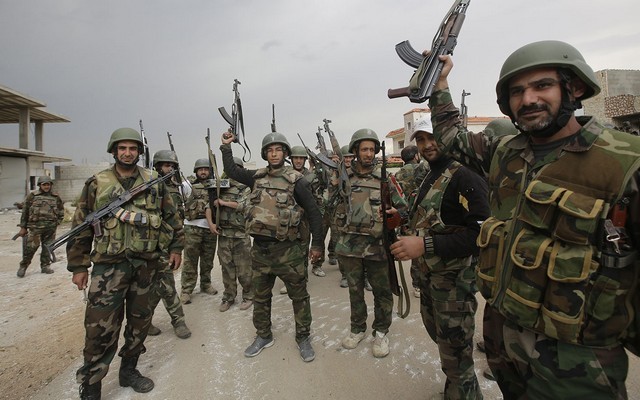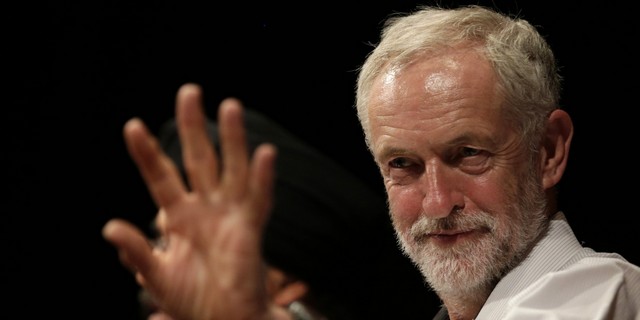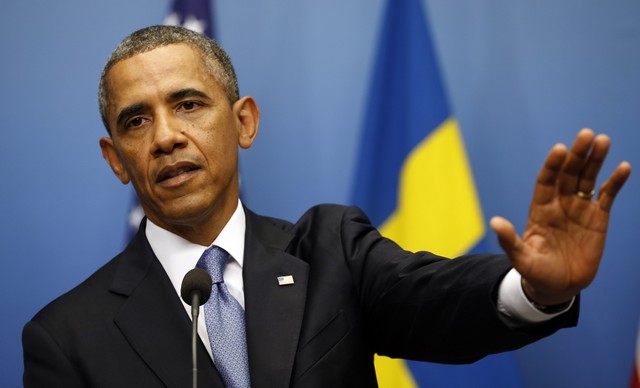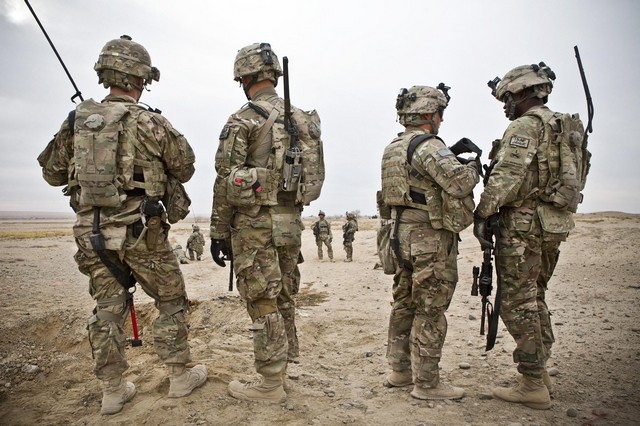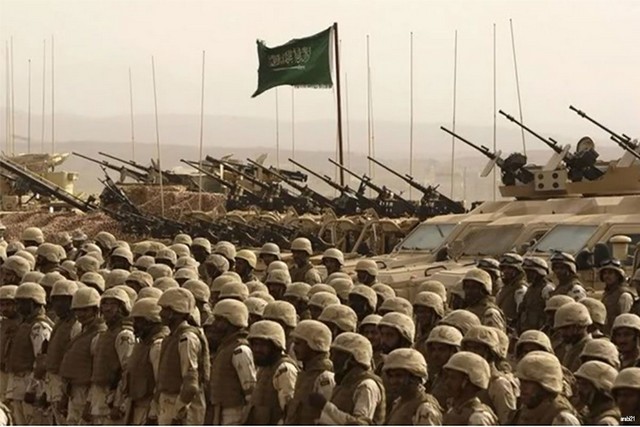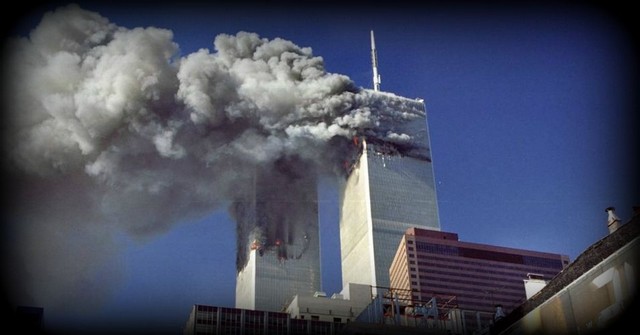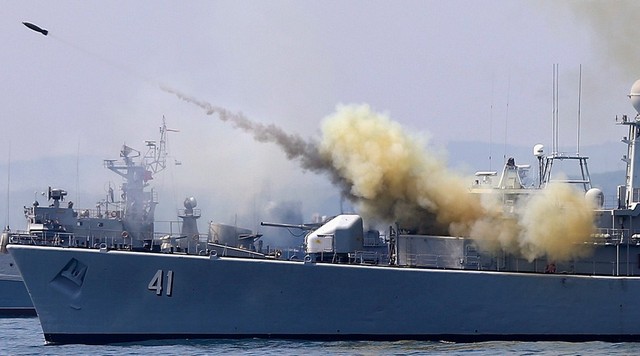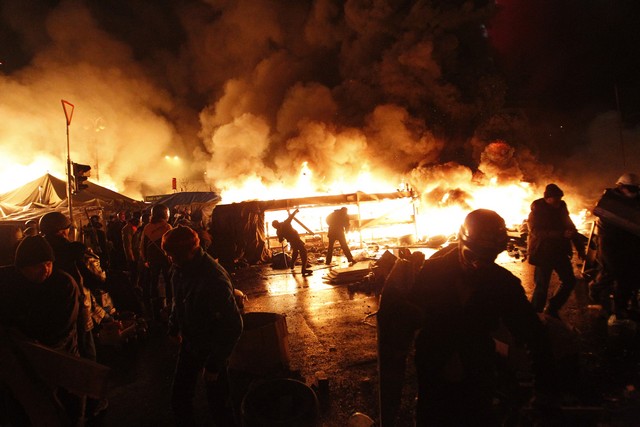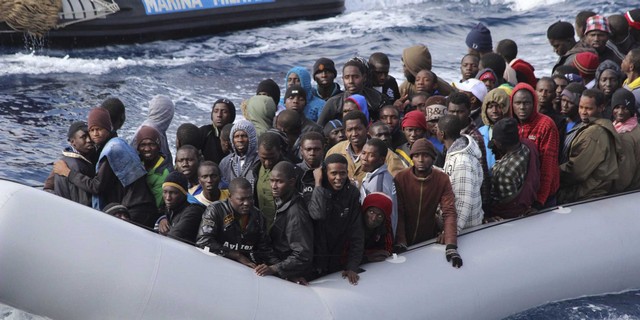By David Vine
With the U.S. military having withdrawn many of its forces from Iraq and Afghanistan, most Americans would be forgiven for being unaware that hundreds of U.S. bases and hundreds of thousands of U.S. troops still encircle the globe. Although few know it, the United States garrisons the planet unlike any country in history, and the evidence is on view from Honduras to Oman, Japan to Germany, Singapore to Djibouti.
Like most Americans, for most of my life, I rarely thought about military bases. Scholar and former CIA consultant Chalmers Johnson described me well when he wrote in 2004, “As distinct from other peoples, most Americans do not recognize — or do not want to recognize — that the United States dominates the world through its military power. Due to government secrecy, our citizens are often ignorant of the fact that our garrisons encircle the planet.”
To the extent that Americans think about these bases at all, we generally assume they’re essential to national security and global peace. Our leaders have claimed as much since most of them were established during World War II and the early days of the Cold War. As a result, we consider the situation normal and accept that U.S. military installations exist in staggering numbers in other countries, on other peoples’ land. On the other hand, the idea that there would be foreign bases on U.S. soil is unthinkable.
While there are no freestanding foreign bases permanently located in the United States, there are now around 800 U.S. bases in foreign countries. Seventy years after World War II and 62 years after the Korean War, there are still 174 U.S. “base sites” in Germany, 113 in Japan, and 83 in South Korea, according to the Pentagon. Hundreds more dot the planet in around 80 countries, including Aruba and Australia, Bahrain and Bulgaria, Colombia, Kenya, and Qatar, among many other places. Although few Americans realize it, the United States likely has more bases in foreign lands than any other people, nation, or empire in history.
Oddly enough, however, the mainstream media rarely report or comment on the issue. For years, during debates over the closure of the prison at the base in Guantánamo Bay, Cuba, nary a pundit or politician wondered why the United States has a base on Cuban territory in the first place or questioned whether we should have one there at all. Rarely does anyone ask if we need hundreds of bases overseas or if, at an estimated annual cost of perhaps $156 billion or more, the U.S. can afford them. Rarely does anyone wonder how we would feel if China, Russia, or Iran built even a single base anywhere near our borders, let alone in the United States.
“Without grasping the dimensions of this globe-girdling Baseworld,” Chalmers Johnson insisted, “one can’t begin to understand the size and nature of our imperial aspirations or the degree to which a new kind of militarism is undermining our constitutional order.” Alarmed and inspired by his work and aware that relatively few have heeded his warnings, I’ve spent years trying to track and understand what he called our “empire of bases.” While logic might seem to suggest that these bases make us safer, I’ve come to the opposite conclusion: in a range of ways our overseas bases have made us all less secure, harming everyone from U.S. military personnel and their families to locals living near the bases to those of us whose taxes pay for the way our government garrisons the globe.
We are now, as we’ve been for the last seven decades, a Base Nation that extends around the world, and it’s long past time that we faced that fact.
The Base Nation’s Scale
Our 800 bases outside the 50 states and Washington, D.C., come in all sizes and shapes. Some are city-sized “Little Americas” — places like Ramstein Air Base in Germany, Kadena Air Base in Okinawa, and the little known Navy and Air Force base on Diego Garcia in the Indian Ocean. These support a remarkable infrastructure, including schools, hospitals, power plants, housing complexes, and an array of amenities often referred to as “Burger Kings and bowling alleys.” Among the smallest U.S. installations globally are “lily pad” bases (also known as “cooperative security locations”), which tend to house drones, surveillance aircraft, or pre-positioned weaponry and supplies. These are increasingly found in parts of Africa and Eastern Europe that had previously lacked much of a U.S. military presence.
Other facilities scattered across the planet include ports and airfields, repair complexes, training areas, nuclear weapons installations, missile testing sites, arsenals, warehouses, barracks, military schools, listening and communications posts, and a growing array of drone bases. Military hospitals and prisons, rehab facilities, CIA paramilitary bases, and intelligence facilities (including former CIA “black site” prisons) must also be considered part of our Base Nation because of their military functions. Even U.S. military resorts and recreation areas in places like the Bavarian Alps and Seoul, South Korea, are bases of a kind. Worldwide, the military runs more than 170 golf courses.
The Pentagon’s overseas presence is actually even larger. There are U.S. troops or other military personnel in about 160 foreign countries and territories, including small numbers of marines guarding embassies and larger deployments of trainers and advisors like the roughly 3,500 now working with the Iraqi Army. And don’t forget the Navy’s 11 aircraft carriers. Each should be considered a kind of floating base, or as the Navy tellingly refers to them, “four and a half acres of sovereign U.S. territory.” Finally, above the seas, one finds a growing military presence in space.
The United States isn’t, however, the only country to control military bases outside its territory. Great Britain still has about seven bases and France five in former colonies. Russia has around eight in former Soviet republics. For the first time since World War II, Japan’s “Self-Defense Forces” have a foreign base in Djibouti in the Horn of Africa, alongside U.S. and French bases there. South Korea, India, Chile, Turkey, and Israel each reportedly have at least one foreign base. There are also reports that China may be seeking its first base overseas. In total, these countries probably have about 30 installations abroad, meaning that the United States has approximately 95% of the world’s foreign bases.
“Forward” Forever?
Although the United States has had bases in foreign lands since shortly after it gained its independence, nothing like today’s massive global deployment of military force was imaginable until World War II. In 1940, with the flash of a pen, President Franklin D. Roosevelt signed a “destroyers-for-bases” deal with Great Britain that instantly gave the United States 99-year leases to installations in British colonies worldwide. Base acquisition and construction accelerated rapidly once the country entered the war. By 1945, the U.S. military was building base facilities at a rate of 112 a month. By war’s end, the global total topped 2,000 sites. In only five years, the United States had developed history’s first truly global network of bases, vastly overshadowing that of the British Empire upon which “the sun never set.”
After the war, the military returned about half the installations but maintained what historian George Stambuk termed a “permanent institution” of bases abroad. Their number spiked during the wars in Korea and Vietnam, declining after each of them. By the time the Soviet Union imploded in 1991, there were about 1,600 U.S. bases abroad, with some 300,000 U.S. troops stationed on those in Europe alone.
Although the military vacated about 60% of its foreign garrisons in the 1990s, the overall base infrastructure stayed relatively intact. Despite additional base closures in Europe and to a lesser extent in East Asia over the last decade and despite the absence of a superpower adversary, nearly 250,000 troops are still deployed on installations worldwide. Although there are about half as many bases as there were in 1989, the number of countries with U.S. bases has roughly doubled from 40 to 80. In recent years, President Obama’s “Pacific pivot” has meant billions of dollars in profligate spending in Asia, where the military already had hundreds of bases and tens of thousands of troops. Billions more have been sunk into building an unparalleled permanent base infrastructure in every Persian Gulf country save Iran. In Europe, the Pentagon has been spending billions more erecting expensive new bases at the same time that it has been closing others.
Since the start of the Cold War, the idea that our country should have a large collection of bases and hundreds of thousands of troops permanently stationed overseas has remained a quasi-religious dictum of foreign and national security policy. The nearly 70-year-old idea underlying this deeply held belief is known as the “forward strategy.” Originally, the strategy held that the United States should maintain large concentrations of military forces and bases as close as possible to the Soviet Union to hem in and “contain” its supposed urge to expand.
But the disappearance of another superpower to contain made remarkably little difference to the forward strategy. Chalmers Johnson first grew concerned about our empire of bases when he recognized that the structure of the “American Raj” remained largely unchanged despite the collapse of the supposed enemy.
Two decades after the Soviet Union’s demise, people across the political spectrum still unquestioningly assume that overseas bases and forward-deployed forces are essential to protect the country. George W. Bush’s administration was typical in insisting that bases abroad “maintained the peace” and were “symbols of… U.S. commitments to allies and friends.” The Obama administration has similarly declared that protecting the American people and international security “requires a global security posture.”
Support for the forward strategy has remained the consensus among politicians of both parties, national security experts, military officials, journalists, and almost everyone else in Washington’s power structure. Opposition of any sort to maintaining large numbers of overseas bases and troops has long been pilloried as peacenik idealism or the sort of isolationism that allowed Hitler to conquer Europe.
The Costs of Garrisoning the World
As Johnson showed us, there are many reasons to question the overseas base status quo. The most obvious one is economic. Garrisons overseas are very expensive. According to the RAND Corporation, even when host countries like Japan and Germany cover some of the costs, U.S. taxpayers still pay an annual average of $10,000 to $40,000 more per year to station a member of the military abroad than in the United States. The expense of transportation, the higher cost of living in some host countries, and the need to provide schools, hospitals, housing, and other support to family members of military personnel mean that the dollars add up quickly — especially with more than half a million troops, family members, and civilian employees on bases overseas at any time.
By my very conservative calculations, maintaining installations and troops overseas cost at least $85 billion in 2014 — more than the discretionary budget of every government agency except the Defense Department itself. If the U.S. presence in Afghanistan and Iraq is included, that bill reaches $156 billion or more.
While bases may be costly for taxpayers, they are extremely profitable for the country’sprivateers of twenty-first-century war like DynCorp International and former Halliburton subsidiary KBR. As Chalmers Johnson noted, “Our installations abroad bring profits to civilian industries,” which win billions in contracts annually to “build and maintain our far-flung outposts.”
Meanwhile, many of the communities hosting bases overseas never see the economic windfalls that U.S. and local leaders regularly promise. Some areas, especially in poor rural communities, have seen short-term economic booms touched off by base construction. In the long-term, however, most bases rarely create sustainable, healthy local economies. Compared with other forms of economic activity, they represent unproductive uses of land, employ relatively few people for the expanses occupied, and contribute little to local economic growth. Research has consistently shown that when bases finally close, the economic impact isgenerally limited and in some cases actually positive — that is, local communities can end up better off when they trade bases for housing, schools, shopping complexes, and other forms of economic development.
Meanwhile for the United States, investing taxpayer dollars in the construction and maintenance of overseas bases means forgoing investments in areas like education, transportation, housing, and healthcare, despite the fact that these industries are more of a boon to overall economic productivity and create more jobs compared to equivalent military spending. Think about what $85 billion per year would mean in terms of rebuilding the country’s crumbling civilian infrastructure.
The Human Toll
Beyond the financial costs are the human ones. The families of military personnel are among those who suffer from the spread of overseas bases given the strain of distant deployments, family separations, and frequent moves. Overseas bases also contribute to the shocking rates of sexual assaultin the military: an estimated 30% of servicewomen are victimized during their time in the military and a disproportionate number of these crimes happen at bases abroad. Outside the base gates, in places like South Korea, one often finds exploitative prostitution industries geared to U.S. military personnel.
Worldwide, bases have caused widespread environmental damage because of toxic leaks, accidents, and in some cases the deliberate dumping of hazardous materials. GI crime has long angered locals. In Okinawa and elsewhere, U.S. troops have repeatedly committed horrific acts of rape against local women. From Greenland to the tropical island of Diego Garcia, the military has displaced local peoples from their lands to build its bases.
In contrast to frequently invoked rhetoric about spreading democracy, the military has shown a preference for establishing bases in undemocratic and often despotic states like Qatar and Bahrain. In Iraq, Afghanistan, and Saudi Arabia, U.S. bases have created fertile breeding grounds for radicalism and anti-Americanism. The presence of bases near Muslim holy sites in Saudi Arabia was a major recruiting tool for al-Qaeda and part of Osama bin Laden’s professed motivation for the September 11, 2001, attacks.
Although this kind of perpetual turmoil is little noticed at home, bases abroad have all too often generate grievances, protest, and antagonistic relationships. Although few here recognize it, our bases are a major part of the image the United States presents to the world — and they often show us in an extremely unflattering light.
Creating a New Cold War, Base by Base
It is also not at all clear that bases enhance national security and global peace in any way. In the absence of a superpower enemy, the argument that bases many thousands of miles from U.S. shores are necessary to defend the United States — or even its allies — is a hard argument to make. On the contrary, the global collection of bases has generally enabled the launching of military interventions, drone strikes, and wars of choice that have resulted in repeated disasters, costing millions of lives and untold destruction from Vietnam to Iraq.
By making it easier to wage foreign wars, bases overseas have ensured that military action is an ever more attractive option — often the only imaginable option — for U.S. policymakers. As the anthropologist Catherine Lutz hassaid, when all you have in your foreign policy toolbox is a hammer, everything starts to look like a nail. Ultimately, bases abroad have frequently made war more likely rather than less.
Proponents of the long-outdated forward strategy will reply that overseas bases “deter” enemies and help keep the global peace. As supporters of the status quo, they have been proclaiming such security benefits as self-evident truths for decades. Few have provided anything of substance to support their claims. While there is some evidence that military forces can indeed deter imminent threats, little if any research suggests that overseas bases are an effective form of long-term deterrence. Studies by both the Bush administration and the RAND Corporation — not exactly left-wing peaceniks — indicate that advances in transportation technology have largely erased the advantage of stationing troops abroad. In the case of a legitimate defensive war or peacekeeping operation, the military could generally deploy troops just as quickly from domestic bases as from most bases abroad. Rapid sealift and airlift capabilities coupled with agreements allowing the use of bases in allied nations and, potentially, pre-positioned supplies are a dramatically less expensive and less inflammatory alternative to maintaining permanent bases overseas.
It is also questionable whether such bases actually increase the security of host nations. The presence of U.S. bases can turn a country into an explicit target for foreign powers or militants — just as U.S. installations have endangered Americans overseas.
Similarly, rather than stabilizing dangerous regions, foreign bases frequently heighten military tensions and discourage diplomatic solutions to conflicts. Placing U.S. bases near the borders of countries like China, Russia, and Iran, for example, increases threats to their security and encourages them to respond by boosting their own military spending and activity. Imagine how U.S. leaders would respond if China were to build even a single small base in Mexico, Canada, or the Caribbean. Notably, the most dangerous moment during the Cold War — the 1962 Cuban missile crisis — revolved around the construction of Soviet nuclear missile facilities in Cuba, roughly 90 miles from the U.S. border.
The creation and maintenance of so many U.S. bases overseas likewise encourages other nations to build their own foreign bases in what could rapidly become an escalating “base race.” Bases near the borders of China and Russia, in particular, threaten to fuel new cold wars. U.S. officials may insist that building yet more bases in East Asia is a defensive act meant to ensure peace in the Pacific, but tell that to the Chinese. That country’s leaders are undoubtedly not “reassured” by the creation of yet more bases encircling their borders. Contrary to the claim that such installations increase global security, they tend to ratchet up regional tensions, increasing the risk of future military confrontation.
In this way, just as the war on terror has become a global conflict that only seems to spread terror, the creation of new U.S. bases to protect against imagined future Chinese or Russian threats runs the risk of becoming a self-fulfilling prophecy. These bases may ultimately help create the very threat they are supposedly designed to protect against. In other words, far from making the world a safer place, U.S. bases can actually make war more likely and the country less secure.
Behind the Wire
In his farewell address to the nation upon leaving the White House in 1961, President Dwight D. Eisenhower famously warned the nation about the insidious economic, political, and even spiritual effects of what he dubbed “the military-industrial-congressional complex,” the vast interlocking national security state born out of World War II. As Chalmers Johnson’s work reminded us in this new century, our 70-year-old collection of bases is evidence of how, despite Ike’s warning, the United States has entered a permanent state of war with an economy, a government, and a global system of power enmeshed in preparations for future conflicts.
America’s overseas bases offer a window onto our military’s impact in the world and in our own daily lives. The history of these hulking “Little Americas” of concrete, fast food, and weaponry provides a living chronicle of the United States in the post-World War II era. In a certain sense, in these last seven decades, whether we realize it or not, we’ve all come to live “behind the wire,” as military personnel like to say.
We may think such bases have made us safer. In reality, they’ve helped lock us inside a permanently militarized society that has made all of us — everyone on this planet — less secure, damaging lives at home and abroad.
David Vine, a TomDispatch regular, is associate professor of anthropology at American University in Washington, D.C. His book, Base Nation: How U.S. Military Bases Abroad Harm America and the World, has just been published as part of the American Empire Project (Metropolitan Books). He has written for the New York Times, the Washington Post, the Guardian, andMother Jones, among other publications. For more information and additional articles, visit www.basenation.us and www.davidvine.net.
14 September, 2015
TomDispatch.com
Copyright 2015 David Vine

